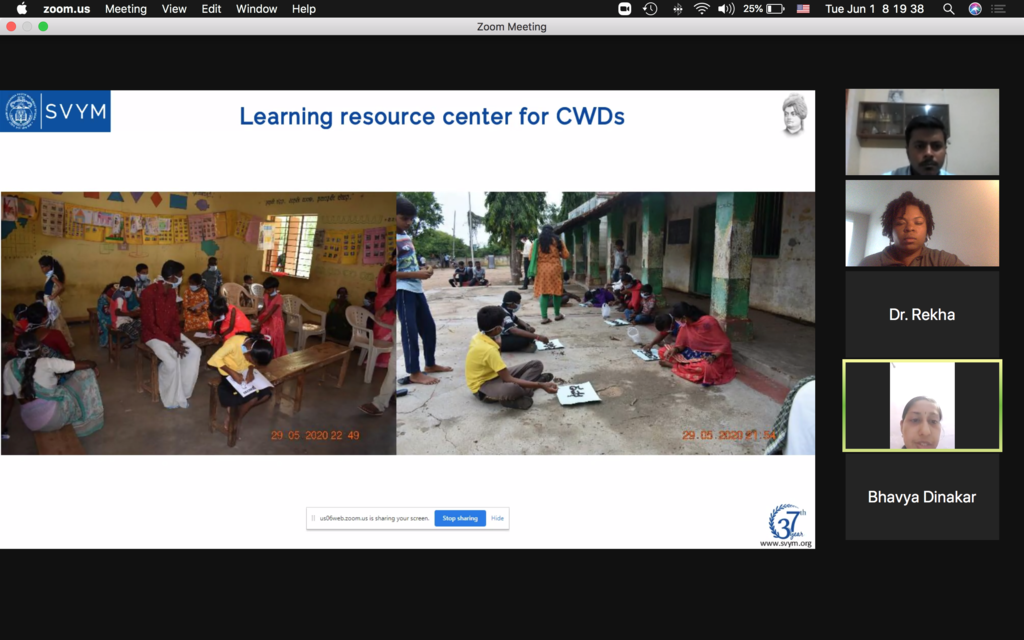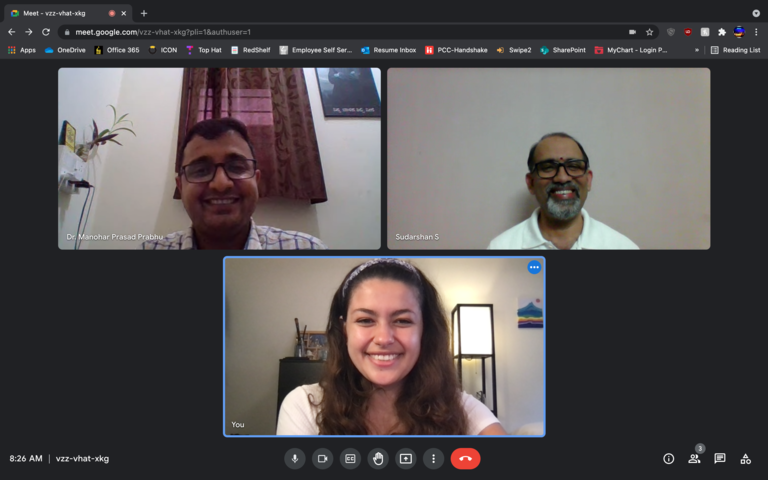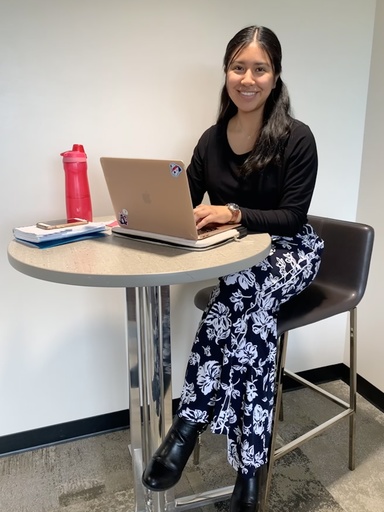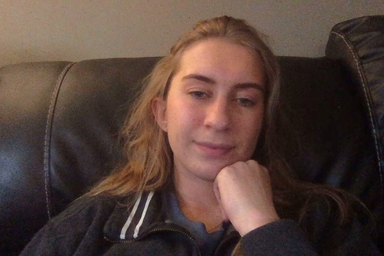Breadcrumb
Summer 2021 GHS SVYM Intern Blog
Sidney Shields, Summer GHS SVYM intern
June 30, 2021

Hello there! My name is Sydney Shields, a senior at the University of Iowa planning to graduate in May 2022 with a BS in Global Health Studies and a minor in Environmental Science. This summer I have been given the opportunity to gain real-world experience in the global health sector as an intern for the Karnataka-based NGO known as the Swami Vivekananda Youth Movement (SVYM). While the COVID-19 pandemic has been devastating, it also provides us with a rare opportunity to study healthcare systems and how they handle and continue to handle the pandemic. Due to this once in a lifetime opportunity, I chose to work on a project that analyzed the first wave of in-patient data of COVID-19 patients at the Vivekananda Memorial Hospital in Saragur.
While the on-going global pandemic restricted us from traveling to India, the staff at SVYM did and continues to do a great job providing us interns with a holistic-internship experience as they deliver zoom lectures on various aspects of both SVYM and the culture of India. My favorite lecture was facilitated by Dr. Niley, a reputable yoga trainer, as he led us through various yoga exercises. He emphasized that yoga is so much more than a physical exercise regimen as it is multidimensional, connecting the physical, mental, spiritual, and psychic dimensions of life.
We are entering the final 2 weeks of our internship, so it is crunch time as the interns are beginning to assemble our final deliverables for our various projects. Coming in with little experience in quantitative data analysis has been very challenging as that is the core aspect of my project but I am extremely grateful for the continued patience and guidance displayed by the SVYM staff and my mentor Ms. Vidyashree.
Learning about the management of COVID-19 patients and analyzing different parameters and outcomes has been very interesting yet challenging. But the challenges are nonetheless rewarding because I know this is important research and will help the SVYM team with how they manage future COVID-19 cases as they will now have a baseline to reference.
Overall, I am extremely grateful for the opportunity to work with SVYM and for the valuable experience I have thus far gained from the internship. I look forward to seeing the other interns’ presentations on what they have been working on for the last weeks and I am excited to share what I have learned. But now I have to get back to work, as data analysis waits for no one!
Alexa Hunt, Summer GHS SVYM Intern
June 24, 2021

Hi! My name is Alexa Hunt, a senior here at the University of Iowa, graduating in December 2021 with a BS in Global Health Studies and a minor in Environmental Policy and Planning. This summer I have been given the opportunity to intern for the Swami Vivekananda Youth Movement (SVYM) and so far, the experience has been an exciting one. Due to the current pandemic, interns were unable to travel to India like summers past, but we have still been able to be immersed in the culture of the organization virtually. My interest in health and the environment and how they interact is what initially drew me to apply for this internship, but it was my experience with children with special needs and disabilities that drew me to my individual project.
The Comprehensive Care, Support, and Treatment for Persons with Disability (CCST-PWDs) section of SVYM is building a feel special-inclusive sensory-motor playground. This playground will be the first of its kind in the country. When built this playground will enable children of all abilities to develop their physical, mental, and sensory abilities. I have been given the task of completing and editing the current user manual for the playground as well as creating a standard operating procedure.
It is the beginning of week 4 and the other interns and I are a little past the halfway point in our internship. I think the hardest part about being virtual is not being able to see and interact with my fellow interns, but we have been making do with GroupMe. I am finished with the first part of my project and now am moving on to the SOP. I am a little nervous that I will run out of time before it is perfect, but I have faith that it will work out.
This project has been a challenge for me more than I thought it would be, but I am grateful for the SVYM team and my mentor for their patience and encouraging words. I strongly believe that this playground will create equitable opportunities for all children who are able to use it while also creating an inclusive community. I’m thrilled to be working on this project and can’t wait to visit India for the ribbon-cutting ceremony.
If you are reading this and thinking about becoming an SYVM intern in the future, 10 out of 10, I recommend it. You will not regret this experience.
Alessandra Dutra, Summer GHS SVYM Intern
June 16, 2021

Hey there! My name’s Alessandra Dutra, and I am a rising senior at the University of Iowa majoring in Global Health Studies on the pre-medicine track. During this summer of 2021 I am interning for a non-governmental organization (NGO) called the Swami Vivekananda Youth Movement (SVYM), which is centered in Mysuru, India in the Karnataka region. Despite being virtual, I have the opportunity to attend and engage in multiple informational sessions about health in India, ranging from education to the federal healthcare system in the country. A major interest of mine is health equity, specifically the intersection between female empowerment and access to health services, and because of that I was immediately drawn to the project I am currently working on. During my time with SVYM I am creating manuals and activity guides for their maternal and child health program which focuses on increasing the health of women pre-conception, post-conception, and post-delivery.
This project is related to a research project that SVYM is currently doing which is investigating the effectiveness of health and lifestyle interventions for women who are married and either already have a child or are trying to become pregnant within the next year. As has been mentioned by my fellow U Iowa interns, cultural awareness and relevance to the applied context is a key part of creating an effective intervention. As a Global Health Studies major, I have discussed and dissected this topic in many of my courses, and now I am being challenged to put into practice my pre-existing beliefs about what it means to be culturally competent.
What I mean by this is that you are never going to know absolutely everything about a region you are working in but it is far more important to push your pride aside and ask the “dumb” questions in order to be useful to your project. This is probably the most prominent thing I have learned over the course of this internship thus far. For example, during my second meeting with my mentor, Dr. Manohar Prasad Prabhu, we were reviewing a scholarly article that detailed the procedure of this experiment and I felt myself hesitating to ask a clarifying question about the terms used to describe state, region, and country because I was afraid of being disrespectful and coming off as ignorant. Dr. Manohar noted my hesitancy and encouraged me to ask my questions anyways, reminding me that asking questions and being unsure is a necessary step to learning and growing.
I feel very lucky to have a mentor like Dr. Manohar. He is the senior manager of community health activities at SVYM’s resource center in Saragur, and he oversees the reproductive and child health community level initiative. During our first meeting we discussed the logistics of the internship and went through our expectations of communication, product delivery, and a proposed timeline of when I should have the modules completed. Since then, we have met weekly and during our meeting today most of our discussion was less about the project and more about comparing the ways of life in the US and in India, particularly with COVID-19. Today’s meeting really allowed me to get to know Dr. Manohar as a person, and I feel as though it has greatly increased my comfort in expressing any concern or confusion I have about this project.
Overall, I am really enjoying my time getting to work with SVYM and with Dr. Manohar. I was quite nervous before the internship started, as I was unsure about it being virtual, but I love the independence and flexibility I have with my schedule and how approachable and resourceful the mentors have been throughout this process. I look forward to learning more, and…Go Hawks!
Aracely Miron-Ocampo, Summer GHS SVYM Intern
June 11, 2021

Hello! My name is Aracely Miron-Ocampo, I am a rising junior majoring in human physiology, earning a certificate in global health studies, and pursuing the pre-med track. This summer 2021, I have the opportunity to learn about global health topics as an intern for the NGO located in Mysuru, Karnataka, India known as the Swami Vivekananda Youth Movement (SVYM). Due to my interests in the medical field, working with underserved populations, and experience working as a nursing assistant, I chose a project involving the creation of a self-care manual for palliative care patients and care givers.
Staying true to the words of the founder of SVYM, Dr. Ramaswami Balasubramaniam (Balu), solutions and development must be “contextually relevant and culturally appropriate,” therefore as interns we began our internship with informational sessions on various topics. These sessions served the purpose of teaching us about Indian culture, the medical field, and the status quo of the country through presentations on topics such as “Healthcare in India,” “Introduction to Palliative Care,” “Disability in India,” “Gender and Health in India,” “Lessons to Learn from COVID-19,” and the “Educational System in India.” With the internship being remote, it is important for me to keep the main takeaways from these informational sessions in mind this summer in order to create a palliative care manual that is both relevant and helpful to various communities.
In addition to learning from various presenters throughout the internship, I am also learning by engaging with my mentor, Dr. Vidya N who works as a medical officer in the palliative care center of SVYM. Through weekly meetings, I discuss my progress, ask questions, and prepare for the expectations of the upcoming week. So far, it has been a little over two weeks since the start of the internship and I feel that I have already learned so much about palliative care from Dr. Vidya.
Palliative care is more than “end of life care” as it applies to any serious health -related suffering. Patients with cancer, chronic renal failure, diabetic foot ulcers, dementia, and paraplegia are some of the people requiring palliative care. Palliative care aims to reduce the pain of patients with these conditions as well as the pain experienced by their families whether it’s physical, psychological, socioeconomic, or spiritual. By clarifying issues, acknowledging their suffering, and providing support, palliative care upholds the dignity of the individual and enhances their quality of life.
Week one of creating the self-care manual for palliative care patients and care givers involved the topic of personal hygiene such as oral, skin & hair, nail, and wound care by taking into account both the abilities and challenges faced by individuals with various conditions. The mentor sessions with Dr. Vidya have helped me understand why the palliative care manual is so important. The most memorable moment I have experienced so far occurred during my week two mentor meeting where Dr. Vidya showed me a picture of a patient with a facial deformity. I was moved by the image and empathized both with Dr. Vidya’s dedication to serve her community and with the patient in the picture who yearned to regain control of their life through their independence. Something that seems so simple to you and me (such as brushing our teeth), has the potential to empower a palliative care patient who had previously lost all hope.
Overall, I am enthusiastic to continue developing this palliative care manual and I look forward to learning from my mentor as well as the many kind and welcoming individuals from SVYM.
Madison Thurm, Summer GHS SVYM Intern
June 1, 2021

Hello, my name is Madison Thurm and I am a 2021 summer intern for the Swami Vivekananda Youth Movement (SVYM) NGO through a partnership with the Global Health Studies Program at the University of Iowa. Each intern, five in all, is assigned their own personal project to complete during the internship. Though interns typically travel to Mysuru, India for the six-week duration of the internship, the COVID-19 pandemic has forced students to engage with SVYM mentors and personnel remotely. The first week began with daily meetings in which interns observed presentations on various healthcare topics specific to India.
On day one, Dr. Rekha Shanmukha provided an introduction to the expectations of the internship and an overview of the healthcare system in India. In regard to the healthcare aspect of this presentation, interns observed a statistical comparison between the US and India and learned about the history of Indian medicine, players in the Indian healthcare system, India’s progress in healthcare, and the challenges of healthcare in India. SVYM promotes universal healthcare because access to healthcare can lead to increased production within the family and community, increased school attendance, decreased out-of-pocket spending, and decreased social inequalities.
On day two, Dr. Vidya introduced the topic of palliative care in India. During this presentation, interns were taught the definition of palliative care and why palliative care is an important aspect of India’s healthcare system. Recently, SVYM has adopted a new care concept in which palliative care is integrated during curative treatment, rather than starting palliative care only as a means of terminal care. Palliative care is an important approach to improve the quality of life of patients. Patients suffering from cancer, stroke, old age, cerebral palsy, HIV, diabetes, muscular dystrophy, spinal cord injuries, and cardiac illnesses are all in need of access to palliative care.
On day three, Dr. Seetharam presented on disability in India. Dr. Seetharam began by explaining the importance of accepting disabled persons unconditionally, and to do so, one must understand the “three D’s” of disability: defect, deficiency, and diversity. Disability depends on a variety of factors, including context, environment, expectation, and individual capacities. Disability is the result of the interaction between the disabled person and the environmental barriers which hinder equal and effective participation in society. To address the needs of the disabled, tackling physical, informational, financial, and systemic barriers is essential.
On the final day of week one, Dr. Bindu presented on gender and women’s health in India. Marginalized genders face significant difficulty in accessing healthcare in India. Barriers to healthcare in regard to gender can be social, cultural, and economic. Social barriers include lack of awareness, lack of time, lack of support, and class and caste. Cultural barriers include expectations, myths and misconceptions, and stigma. Economic barriers include poverty, expenses, and lack of control over resources. Education is an important step in this SVYM program in overcoming patriarchal norms which currently restrict marginalized persons from attaining adequate healthcare.
In the upcoming week, interns will meet with their assigned mentors to begin on the specifics of their projects. Each of us is looking forward to learning more about our topics and diving into the nitty-gritty aspects of our projects